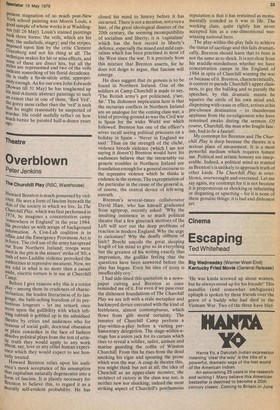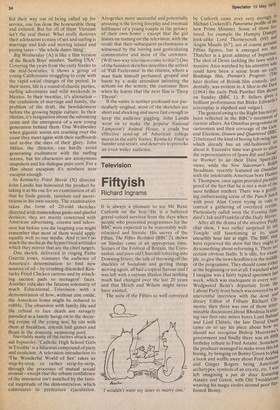Cinema
Escaping
Ted Whitehead
131g Wednesday (Warner West End) Kentucky Fried Movie (General Release) 'He was kinda screwed up about women, but he always stood up for his friends!' This maudlin (and somewhat ambiguous) epitaph is spoken by three friends over the grave of a buddy who had died in the Vietnam War. Two of the three have bluf fed their way out of being called up for service, one has done the honourable thing and enlisted. But for all of them Vietnam isn't the real threat. What really destroys their adolescent ecstasy of sex and surfing is marriage and kids and moving inland and paying taxes — 'the whole damn thing'.
Big Wednesday (A) is like a film version of the Beach Boys' number, 'Surfing USA'. Covering the years from the early Sixties to the mid-Seventies, it shows a group of young Californians struggling to cope with the rapid social changes of the period. In their teens, life is a round of chaotic parties, surfing adventures and wild weekends in Mexico. In their twenties, it's alienation — the confusions of marriage and family, the problem of the draft, the bewilderment before the growing hippie culture. In their thirties, it's resignation about the advancing year and the emergence of a new young generation behind them. One Wednesday when gigantic waves are crashing over the coast they meet again with their surfboards and re-live the days of their glory. John Milius, the director, can hardly avoid generating excitement with the surfing scenes, but his characters are anonymous snapshots and his dialogue pure corn. For a film about escapism it's nowhere near escapist enough.
In Kentucky Fried Movie (X) director John Landis has honoured the product by taking it as his cue for an examination of all that he finds greedy, tasteless and meretricious in his own society. The examination takes the form of 20-odd sketches directed with tremendous gusto and gleeful derision; they are mainly concerned with American advertising, cinema and television but before you die laughing you might remember that most of them would apply equally well to our media. And it isn't so much the media as the hypocritical attitudes which they mirror that are the chief targets.
One sketch, delivered in ringing Pathe Gazette tones, reassures the audience of America's determination to find new sources of oil — by crushing discarded Kentucky Fried Chicken cartons and by attaching suction pads to teenagers' faces. Another ridicules the fatuous solemnity of much Educational Television with a demonstration of how, without zinc oxide, the American home might be reduced to rubble. The obsession with family life and the refusal to face death are savagely parodied as a family hangs on to the decaying corpse of the young son; he sits with them at breakfast, attends ball games and floats in the domestic swimming pool. Inevitably many of the satires attack sexual hypocrisy. 'Catholic High School Girls in Trouble' is a hilarious compound of piety and eroticism. A television introduction to 'The Wonderful World of Sex' takes us step-by-step, or rather strip-by-strip, through the processes of mutual sexual arousal — except that the urbane confidence of the instructor isn't matched by the farcical ineptitude of the demonstration, which culminates in premature ejaculation. Altogether more successful and potentially arousing is the loving foreplay and eventual fulfilment of a young couple in the privacy of their own home — except that the girl insists on turning on the television, with the result that their subsequent performance is witnessed by the leering and gesticulating commentator and most of the crewmen. (Will two-way television come to this?) One of the funniest sketches describes the arrival of 'Full Feelerama' in the cinema, where a man finds himself perfumed, groped and burnt by a male attendant imitating the actions on the screen; the customer flees when he learns that the next film is 'Deep Throat'.
If the satire is neither profound nor particularly original, most of the sketches are short and shocking and move fast enough to keep the audience giggling. John Landis went on to make the popular National Lampoon's Animal House, a crude but effective send-up of American college mores in the early Sixties. Kentucky Fried is funnier and sexier, and deserves to provoke an even wider audience.












 Previous page
Previous page